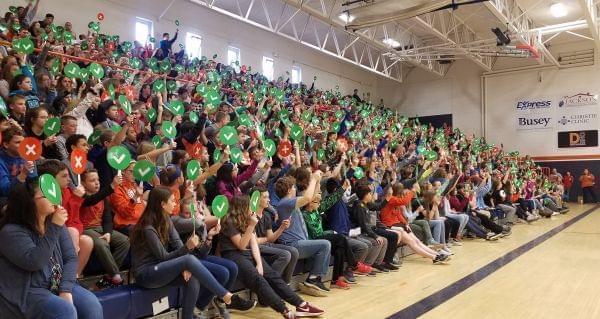Middle School Kids In Mahomet Get A Lesson In Good Internet Conduct From Google

Students at Mahomet-Seymour Junior High School hold up cards with a check sign for "Yes", to answer a question during Google's "Be Internet Awesome" presentation. Jim Meadows/Illinois Public Media
Middle school kids in the Champaign County town of Mahomet got a lesson last week on playing safe online, courtesy of Google.
The lesson played out in the gymnasium of Mahomet-Seymour Junior High School. There, the school’s more than 700 students, in grades six through eight, only had to be shushed occasionally by Jamie Hill and David Sanchez, during their program on good Internet behavior.
“Because we spend so much of our lives online, it’s important to know how to safely and confidently use the Web,” said Sanchez as the program got underway. “In other words, how to be something we call Internet Awesome.”
That’s right,” said Hill, continuing the message. “So, to be Internet Awesome, it means to be smart, it means to be strong, brave, kind and alert online.”
Hill and Sanchez kept the presentation moving with visuals and polling questions, that the students answered with paddle-signs with a green check on one side (for “yes”) and a red “x” on the other (for “no”). A question about who used the Internet to follow the Chicago Cubs drew a sharply divided and highly vocal response.
One of the visuals was a reference to Adele’s 2016 appearance in the “Carpool Karaoke” feature on James Corden’s late night TV show. Sanchez noted that the video had accumulated 193 million views to date.
But Hill told the students that other sharing on the Internet might not be as entertaining.
”Imagine, though, if what was going around and going viral wasn’t so funny,” she said. “Maybe it was an embarrassing photo or a mean-spirited comment. Or maybe it was something about you. You have to think about how quickly something can get shared around the entire school, the entire town, the entire state.”
“We tell them to do the Grandparent Test,” Hill explained, as students filed into the gym for the Google presentation. “Think about, you know, would you want your grandparents to see if you shared something online? And help contextualize (for the students) that there are a lot of people online. And while it might seem far away, what you share today can impact your life down the road.”
The lesson about being careful about sharing online illustrated the first of the five qualities that Hill and Sanchez listed at the beginning of their 45-minute presentation. Other lessons during the program were: don’t fall for phishing attempts or other fakery; make sure your passwords are strong; treat others online as you would like to be treated; and when you see something online that you’re worried or unsure about, talk it over with a trusted adult.
Google launched its “Internet Awesome” program in 2017, and the in-school presentation is just part of it. Hill says the middle school years are a crucial age for kids to learn about good online behavior, because it’s a time when they’re beginning to spend more time online without supervision.
“And so we’re hoping that through outreach and programs like this, we’re able to help them build best practices now,” said Hill. “We call it kind of the driver’s ed for the web, to set them up for success, as they continue, you know, to be online for the future.”
Google scheduled its “Internet Awesome” appearance at Mahomet-Seymour Junior High School by reaching out to the office of U.S. Rep. John Shimkus (R-Collinsville). Shimkus says he reached out to a colleague, State Senator Chapin Rose of Mahomet, who suggested the school. Both elected official made brief remarks to open the program.
“I think it’s good, as you extol the great virtues and benefit of the information that’s out there (online),” said Shimkus, “to teach and instruct these young men and women on being cautious and skeptical about some of the promises or advertisements they may run into while they’re surfing the Worldwide Web. But the other side is, also use it for good, not bullying, not attacking, but lifting people up.”
Google worked with education, parental and Internet safety groups, including the National P.T.A., to develop its “Be Internet Awesome” campaign. It includes online components for parents and educators to use, including “Interland”, where players can work out good online behavior in a video-game setting.
Hill says Google has brought its “Be Internet Awesome” school presentation to some 66,000 students in about 36 states, so far. The company has launched another education campaign in the United Kingdom, called “Internet Citizens”.
But the Google educational campaigns have detractors, who say the programs like “Be Internet Awesome” leave out a key component that young people should be careful of ---- tech giants like Google itself, and the way they collect personal information, and track the actions of Internet users.
A 2018 New York Times article quotes critics who say the Google presentations present the company as impartial, when young people are actually a key target audience for it and other online tech companies.
The article quotes David Monahan with the non-profit advocacy group, Campaign for a Commercial-Free Childhood: “All these supposedly free platforms are not free and that all of us are being tracked and our information is really the commodity we’re paying.” Monahan said the Google campaign leaves out information about how big tech companies conduct themselves online that young people should know.

